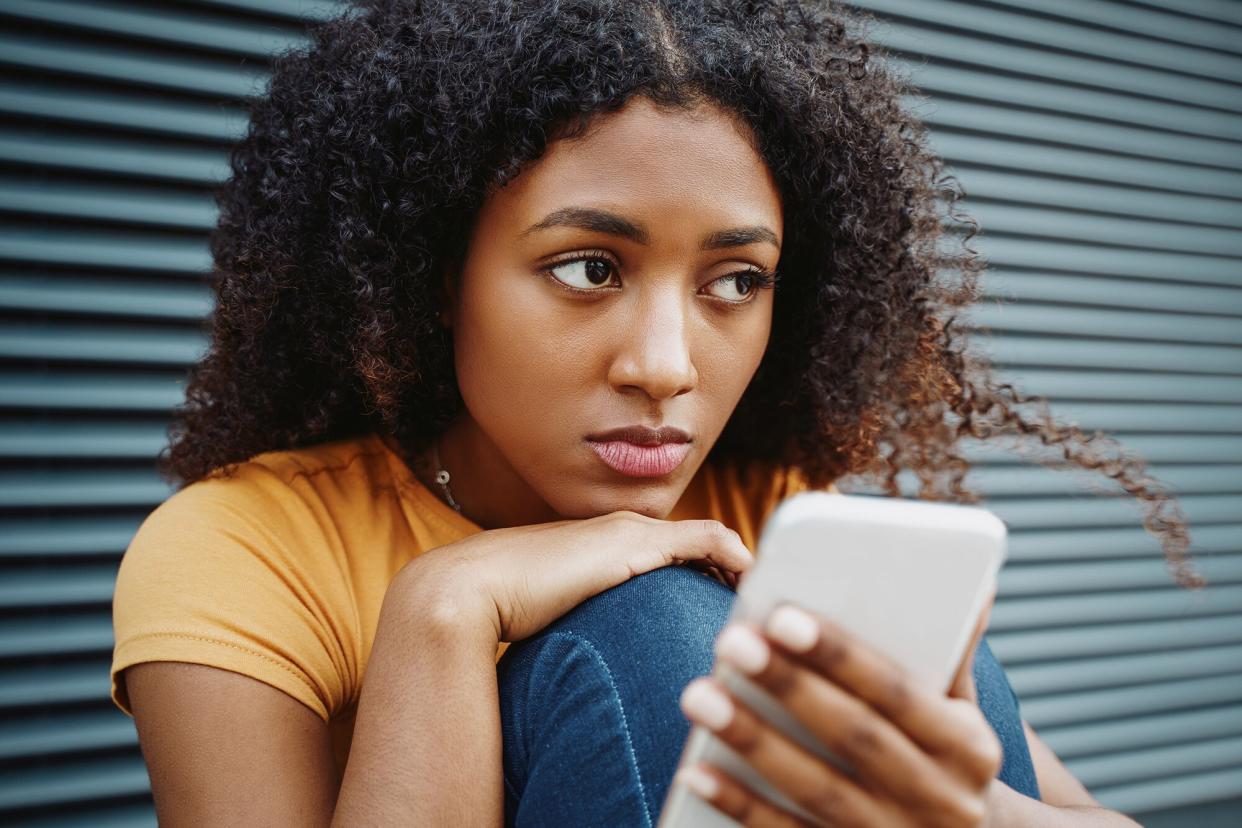Harmful DIY Abortion Advice Is Circulating Online, and It's Dangerously Easy to Find

Getty Images
These days, it's not difficult to find misinformation masquerading as expert advice for almost anything online. This includes "advice" on how to end a pregnancy online. To be clear, information on the subject has been circulating in all corners of the internet long before the Supreme Court overturned Roe v. Wade, the landmark case that guaranteed the federal right to abortion. That's likely because extreme abortion restrictions in some states have been in place for years. In fact, there were more than 700,000 searches for self-induced abortions in the U.S. in 2015, according to reporting by The New York Times. At the time, tens of thousands of searches involved inducing pregnancy with herbs, such as parsley, and vitamin C, reported the newspaper.
Now, social media makes the spread of this kind of dangerous information even more accessible and less vetted, as anyone with an account can share and view content on the platforms. For example, some clips on TikTok about DIY abortions suggest herbal remedies, including drinking parsley tea and mugwort tea. (Mugwort, in case you're not familiar, is a plant that may cause your uterus to contract and is not considered safe for use during pregnancy, per the National Center for Complementary and Integrative Health (NCCIH).) Google searches for mugwort tea and how it relates to preventing pregnancy are currently on the rise, as are queries about parsley tea for inducing periods and abortion.
Other unauthorized "solutions" for self-induced abortions on TikTok include taking high doses of vitamin C, cinnamon, aspirin, chamomile tea, and evening primrose oil, for instance. While TikTok's community guidelines state the app "will remove misinformation that causes significant harm to individuals, our community, or the larger public regardless of intent," many videos are still currently available to view. And if history is any indication, with 16 states banning or planning to ban abortion in all cases after the fall of Roe v. Wade, more people may seek advice for terminating an unwanted pregnancy on their own without proper medical care.
If you live in a state that has banned or plans to ban abortion now that Roe v. Wade has been overturned, it's understandable to feel frustrated and scared if you find yourself facing an unintended pregnancy. But to be abundantly clear, getting medical advice from social media has serious ramifications, and attempting to terminate a pregnancy on your own could result in other health problems.
"It can be incredibly dangerous to seek medical advice on social media," reiterates women's health expert Jennifer Wider, M.D. "We saw this during the height of the COVID-19 pandemic, spreading false information and offering guidance about ways to prevent the virus...The problem is that the information is not vetted and is often medically inaccurate and potentially dangerous."
Not to mention, all these so-called DIY methods for ending a pregnancy don't even work, according to experts. "If herbs worked [to induce abortion], they would have been recommended by doctors all along," says Lauren Streicher, M.D., a professor of clinical obstetrics and gynecology at Northwestern University's Feinberg School of Medicine. Suggestions such as taking mugwort or high doses of vitamin C "don't work," she says plainly.
You can also get sick from taking large amounts of herbs, points out Jessica Shepherd, M.D., an ob-gyn in Texas and founder of Sanctum Med Wellness. "There is no medical evidence that a cocktail of herbs will induce an abortion, and also, this can potentially be negatively affected by dosage variations and what herbs are being used," she adds.
It's important to remember that abortion is a medical situation that needs actual medical advice, says Dr. Shepherd. "There is a lot of information that is needed before determining what is the best management plan for each individual," she says. "Having a plan by a health care professional is the best option, always, as there are differences in each experience."
If you can, experts recommend doing your best to be prepared for the just-in-case, rather than turning to the internet for alternative solutions. "Have emergency contraception [such as Plan B] ready to go at home so that, if you do have unprotected sex, you can use it," says Dr. Streicher, adding that "the sooner you take it, the better."
Of course, stockpiling emergency contraception could mess with the supply chain and make it harder for someone to access this crucial medicine when they need it. So, Dr. Streicher recommends buying just one dose of emergency contraception if you think you'll need it at some point. While emergency contraception will remain effective for years, be sure to check the expiration date before using it, as it may not be effective if it has expired. (You can currently buy emergency contraception, despite the strike down of Roe v. Wade, at drugstores without a prescription, BTW.)
You might also consider having abortion pills at the ready at home if you can get them, suggests Dr. Streicher. If you live in a state where abortion is still legal, you can get them in the mail with a prescription or in person at a local clinic or pharmacy. That's just one of the reasons why it's more important than ever to understand individual state laws concerning abortion in the case you might want one.
Overall, doctors stress that you shouldn't turn to social media for abortion care if you need it. "Risking your health and well-being is not worth it," says Dr. Wider.

